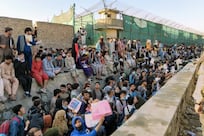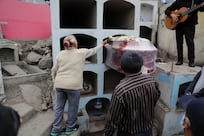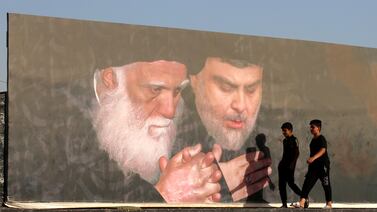Iraq’s influential Shiite cleric Moqtada Al Sadr has ruled out further participation in the country's political process, until it is purged of “the corrupt”, days after the mass resignation of his followers in parliament.
Mr Al Sadr ordered members of parliament affiliated with his movement to submit their resignations on Sunday as a deadlock over forming a post-election government entered its eighth month.
On Wednesday he announced his withdrawal from the political process to MPs gathered in the southern city of Najaf, where he lives.
Mr Al Sadr is one of Iraq's most powerful figures, with a national following, and the move has thrown the political process into doubt.
“I decided to withdraw from the political process in order not to participate with the corrupt in any way, neither in this world nor in the hereafter,” he told politicians seated in rows on the ground in a hall in Najaf.
“What I want to tell you is that in the next stage, I will not participate in the coming elections also with the corrupt.”
He said he would participate in elections only if the “corrupt and those who have stolen Iraq are removed”.
Mr Al Sadr's efforts to form the next government failed despite his followers, known as the Sadrists, having made a strong showing in October's general election, when they won 73 seats in the 329-seat Parliament.
His desire to form a majority government only with Sunni and Kurdish parties upset his rivals in the Co-ordination Framework, an umbrella group of Iran-backed militias and parties that suffered major losses in the election.










